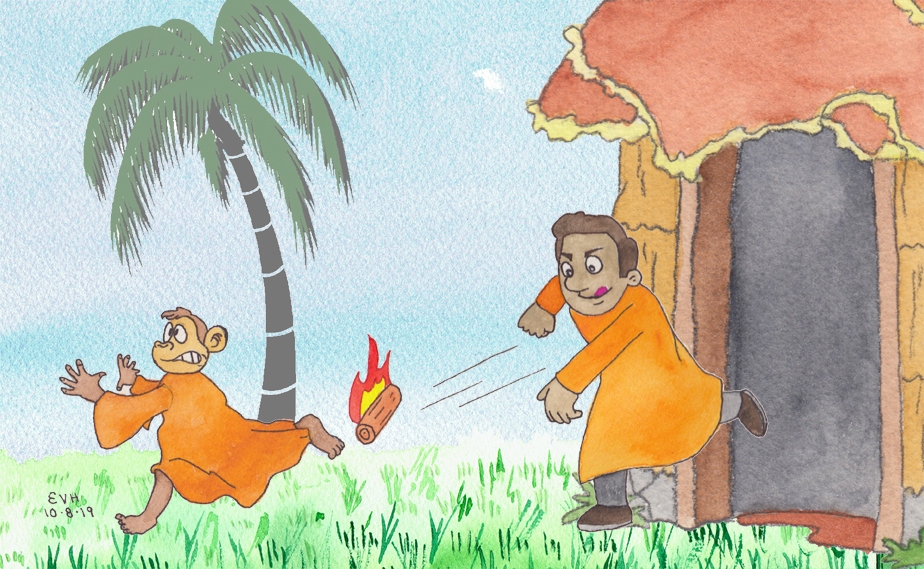
Jataka 173
Makkaṭa Jātaka
The Deceitful Monkey
as told by Eric Van Horn
originally translated by William Henry Denham Rouse, Cambridge University
originally edited by Professor Edward Byles Cowell, Cambridge University
This story makes more sense if you read Jātaka 487. In that story the main character – who in the story of the past is a monkey – is an extremely ill-behaved monk, someone who was very deceitful. On its own this story seems to lack compassion for the poor monkey. It may even without the backstory!
“Father, see that poor old fellow?” The Master told this story while he was staying in Jetavana. It is about a scoundrel. The circumstances will be explained in the Uddāla Jātaka (Jātaka 487). Here too the Master said, “Monks, this is not the only time this fellow turned out to be a scoundrel. In days gone by, when he was a monkey, he played tricks for the sake of a fire.” And he told this story of the past.
Once upon a time, when Brahmadatta was reigning in Benares, the Bodhisatta was born into a brahmin family in the village of Kāsi. When he came of age, he received his education at Takkasilā University, after which he settled down in life.
His wife in time bore him a son and later a daughter. And just when the young girl was able to run, she died. The husband performed her funeral rites, and then he said, “What is home to me now? I and my son will live the life of recluses.” Leaving his friends and family in tears, he took the boy to the Himalaya. He became a religious recluse and lived on the fruits and roots that the forest yielded.
One day during the rainy season, after there had been a downpour, he kindled some sticks. Then he lay down on a bed roll and warmed himself at the fire. His son sat beside him rubbing his feet.
Now a wild monkey, miserable with cold, saw the fire in the recluse’s hut. “Now,” he thought, “if I go in, they’ll cry out ‘monkey!’ ‘Monkey!’ and drive me out. I won’t get a chance to warm myself.” Then he thought, “I have it! I’ll get a recluse’s robes and get inside by tricking them!”
So he put on the robes of a dead recluse, took his begging bowl and walking stick, and stood by the door of the hut where he crouched down beside a palm tree. The boy saw him and – not knowing he was a monkey - cried to his father “Here’s an old recluse, sure enough, miserably cold, who has come to warm himself at the fire.” Then he addressed his father in the words of the first stanza, begging him to let the poor fellow in to warm himself:
“Father, see! a poor old fellow huddled by a palm tree there!
Here we have a hut to live in. Let us give the man a share.”
When the Bodhisatta heard this, he got up and went to the door. But when he saw the creature was only a monkey, he said, “My son, men do not look like that. It is a monkey, and he must not be asked in here.” Then he repeated the second stanza:
“He would but defile our dwelling if he came inside the door.
Such a face – it is easy to see - no good brahmin ever bore.”
The Bodhisatta seized a burning piece of wood, crying, “What do you want there?” and threw it at him, driving him away. Mr. Monkey dropped his robe, sprang up a tree, and ran away into the forest.

Figure: “Go Away, Deceitful Monkey!”
Then the Bodhisatta cultivated the Four Excellences (the brahma-vihāras) until he was reborn in Brahma’s heaven.
When the Master had ended this discourse, he identified the birth: “This tricky monk was the monkey of those days. Rāhula was the recluse’s son, and I was the recluse.”
